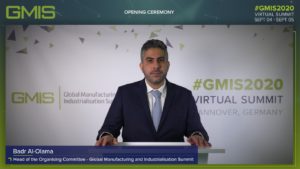Global Manufacturing And Industrialisation Summit To Identify new Index To Measure Industrial, Environmental, Social, Corporate Governance Performance
The Global Manufacturing and Industrialisation Summit (GMIS) today held a working group on the sidelines of the first day of the #GMIS2020 Virtual Summit, gathering a cross-section of experts from world-leading organisations to help drive and develop a new Inclusive and Sustainable Industrial Performance Index that will help measure the Environmental, Social, and Corporate Governance (ESG) performance of public and private sector entities.
While industrialisation results in many acknowledged benefits, it also generates a number of challenges, particularly in relation to the environment and therefore critical actions are needed to minimise the environmental degradation caused by industrial pollution, as well as to advance decent work and equitable social welfare as the foundation for Inclusive and Sustainable Industrial Development (ISID).
Fourth industrial revolution (4IR) technologies hold huge potential to bring about ISID and advance the Sustainable Development Goals (SDGs), specifically SDG 9. Technological progress is the foundation of efforts to meet environmental objectives such as increased resource and energy-efficiency. However, the diffusion of advanced digital production technologies remains concentrated globally, with only weak adoption in most emerging economies.
The virtual meeting of the working group focused on the need and opportunity to develop an index which would successfully integrate the economic, environmental, social and governance dimensions of industrial development and the manufacturing sector, and which would take into account considerations pertaining to 4IR and impact investment.
Participants in the working group included Sorin Cohn-Sfetcu, ISO 56008 Project Leader for Innovation Measurements, International Organization for Standardization (ISO), Geoffrey Hamilton, Chief Cooperation and Partnership Section, United Nations Economic Commission for Europe (UNECE), Rene Kamp, Professorial fellow at UNU-MERIT and Professor of Innovation and Sustainable Development at ICIS, Maastricht University, Valentin Todorov, Senior Manager, UNIDO, Nathan Fabien, Chief Responsible Investment Officer, UN Principles for Responsible Investments (UNPRI), Jose Pineda, Senior Researcher, United Nations Development Programme (UNDP), Kate Field, Global Head Health, Safety and Wellbeing British Standards Institution (BSI), and Maria del Sorbo, Monitoring, Indicators & Impact Evaluation Unit, Joint Research Center (JRC) of the European Commission.
Moderating the session, Fernando Cantu Bazaldua, Chief Statistician, UNIDO, said: “The Fourth Industrial Revolution cannot function without high quality data, statistics and knowledge products, as these are fundamental for evidence-based policymaking and monitoring inclusive and sustainable industrial development.”
Maria Del Sorbo, of the Joint Research Centre at the European Commission added: “Advanced innovation is underpinned by data. For an inclusive and sustainable future of manufacturing, we must ensure that digital industries are built on reliable, comparable, robust and disaggregated data.”
At a country level, a considerable number of tools aimed at systematically measuring and benchmarking the industrial performance of economies exist, with some placing emphasis on the inclusive and environmental dimensions. Prominent examples include the ISID Index, the Competitive Industrial Performance (CIP) Index, the SDG9 Index, and the Green Industrial Performance Index (GIP index), among others.
Badr Al-Olama, Head of the Organising Committee for the Global Manufacturing and Industrialisation Summit, said: “There is a clear need for a multi-dimensional industrial performance index that can assess a country’s industrial progress while also measuring the environmental, social, and governance (ESG) performance of its private sector entities. The index could serve as an objective tool for governments to enhance their policy-making and their regulatory frameworks, assist in monitoring and evaluating the progress towards sustainable development, and support investors and the private sector in making responsible investment decisions that are not purely based on financial metrics.”









